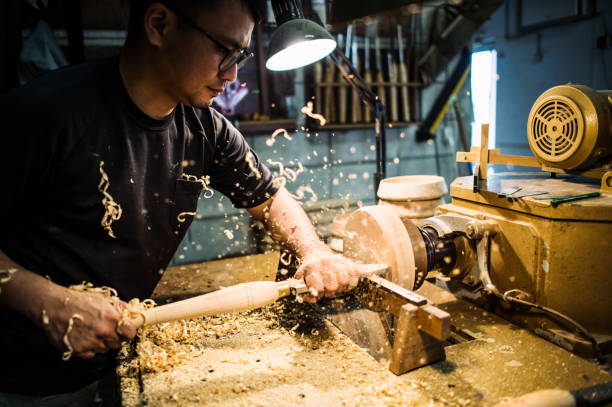Inspectors from the Health and Safety Executive (HSE) will be visiting woodworking businesses to check they are managing the respiratory risks from wood dust.
 Britain’s health and safety watchdog warns that many businesses in the woodworking industry are endangering their workers’ lives by failing to implement the required safety measures to prevent or control exposure to wood dust.
Britain’s health and safety watchdog warns that many businesses in the woodworking industry are endangering their workers’ lives by failing to implement the required safety measures to prevent or control exposure to wood dust.
Woodworking industries, such as sawmilling, manufacture of composite boards and carpentry, carry a significant risk of occupational ill-health caused by exposure to inadequately controlled wood dust. This includes sino-nasal cancer, occupational asthma and dermatitis.
Wood dust inspections support HSE campaign
 The focused inspection initiative forms part of the HSE’s Dust Kills campaign and will raise awareness of the health issues related to dust exposure.
The focused inspection initiative forms part of the HSE’s Dust Kills campaign and will raise awareness of the health issues related to dust exposure.
The Dust Kills campaign aims to provide free simplified advice and guidance to help employers and workers understand the risks involved and how they can stay healthy while working.
HSE inspectors will be checking that employers and workers understand the risks, that they plan their work accordingly and that they are using effective control measures to protect workers from harm.
The regulator will take enforcement action against businesses where necessary.
8 in 10 woodworking businesses not managing wood dust risks
 During 2022-23, the HSE conducted over 1,000 inspections on woodworking businesses and found that nearly 8 in 10 (78%) were failing to protect workers from respiratory sensitisers. They took 402 enforcement actions and highlighted particular concerns around provision and use of suitable Respiratory Protective Equipment (RPE) and Local Exhaust Ventilation (LEV) as well as the administration of health surveillance.
During 2022-23, the HSE conducted over 1,000 inspections on woodworking businesses and found that nearly 8 in 10 (78%) were failing to protect workers from respiratory sensitisers. They took 402 enforcement actions and highlighted particular concerns around provision and use of suitable Respiratory Protective Equipment (RPE) and Local Exhaust Ventilation (LEV) as well as the administration of health surveillance.
The Head of Manufacturing at HSE, David Butler, said:
“Around 12,000 workers died last year from lung diseases linked to past exposure from work, and there are an estimated 19,000 new cases of breathing and lung problems each year, where individuals regarded their conditions as being caused or made worse by work.
“Wood dust can cause serious health problems. It can cause asthma, which carpenters and joiners are four times more likely to get compared with other UK workers, as well as sino-nasal cancer. Our campaign aims to help businesses whose workers cut and shape wood to take action now to protect their workers’ respiratory health.”
He added that HSE inspectors conducting visits to woodworking businesses would “look at the measures they have in place to comply with the guidance and protect workers from respiratory diseases such as occupational asthma and sino-nasal cancer.”
He added:
“Our inspection initiative aims to ensure employers and workers are aware of the risks associated with the activities they do. They must recognise these dangers and manage these risks through reducing exposure. Employers need to do the right thing, for example, through completing a risk assessment, ensuring workers are trained, reducing exposure using LEV and using suitable RPE to protect workers, where required.”
Essential health and safety training
First Response Training (FRT) is a leading, national training provider.
 They deliver a wide and diverse range of training courses in the fields of health and safety, first aid, fire safety, manual handling, food hygiene, specialist safety, mental health, health and social care and more.
They deliver a wide and diverse range of training courses in the fields of health and safety, first aid, fire safety, manual handling, food hygiene, specialist safety, mental health, health and social care and more.
They can offer courses in subjects such as Asbestos Awareness, Handling of Hazardous Substances and accredited options such as IOSH Working Safely and IOSH Managing Safely.
A trainer from FRT says:
“Exposure to dust in the workplace is responsible for thousands of deaths each year and even more cases of work-related ill-health and working days lost.
“It’s so important that employers protect themselves and their workers by following simple, common sense health and safety measures that protect their long-term health.”
For more information on any of the training courses that FRT can offer, please call them on freephone 0800 310 2300 or send an e-mail to info@firstresponsetraining.com.
